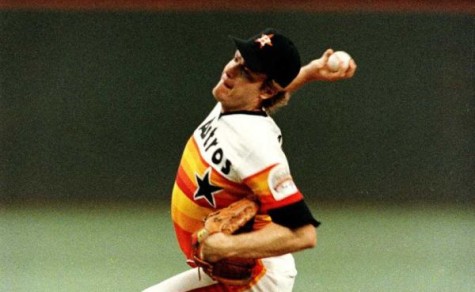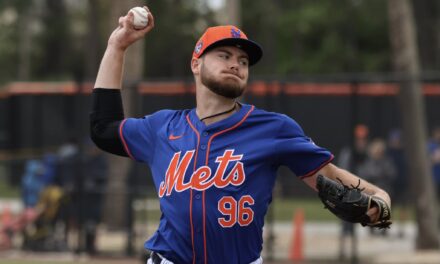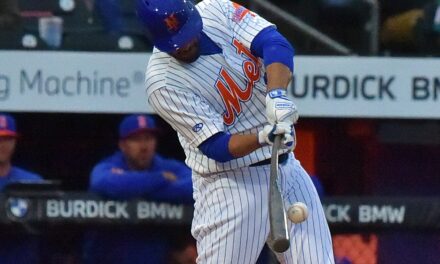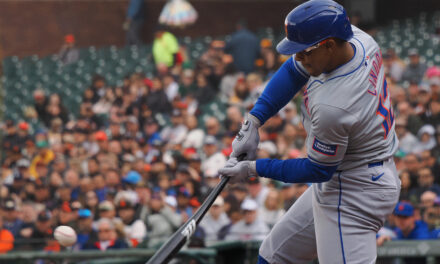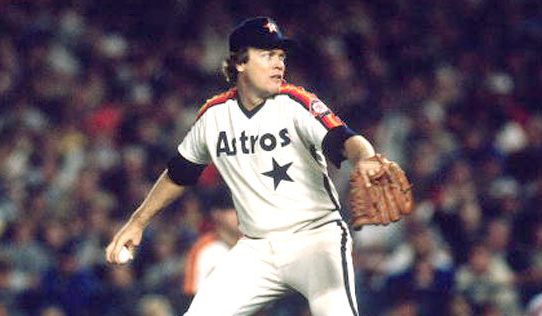
Former New York Mets catcher Ed Hearn says he has a bag of baseballs in his cellar. They are all from 1986; all from the National League Championship Series; all evidence that Michael Warren Scott cheated.
The rumors started long before the NLCS. In May 1985, during one of Scott’s starts at Wrigley Field, Chicago Cubs first baseman Leon Durham found a piece of sandpaper near the mound, “brand new, cut in a circle, big enough to hide in his glove,” Durham told the Chicago Tribune.
In September 1986, two weeks before Scott no-hit the San Francisco Giants to clinch the National League West, the Cincinnati Reds were in Houston. Starter Tom Browning took the mound to warm up. When he picked up the ball, Browning claimed the ball had “… a big ol’ scuff mark … as clear as a quarter on a piece of paper. That wasn’t an accidental scuff from contact.”
“It’s the consensus around the league that Mike Scott cheats,” Mets catcher Gary Carter said after Scott threw his no-hitter.
Scott denied the accusation. His catcher Alan Ashby denied the accusation. Ashby credited the aces split-finger fastball. “If everybody in the league learns to throw that pitch like that, you’ll have a batting champion hitting about .210,” Ashby said.
On July 19, in his only regular season start against New York, Scott’s split-finger neutralized the Mets at the Astrodome, pitching 8 1/3 innings, allowing five hits in a 5-4 Houston win.
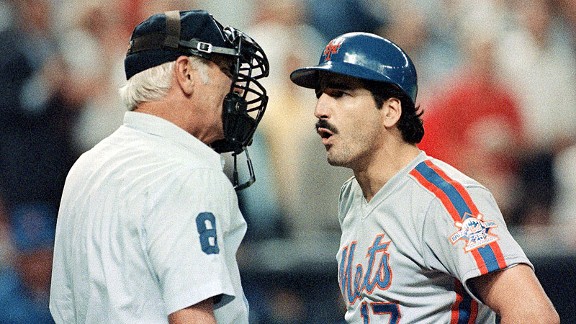
In Game One of the NLCS, Scott did more than hold off the Mets, he humbled them. The Cy Young Award winner struck out a record-tying 14, including Keith Hernandez (three times), Darryl Strawberry (three times) and Carter (twice), and allowed only five hits as the Astros won the opening game of the National League playoffs 1-0 before 44,131 at the Astrodome.
In the first inning, Carter swung at strike two and asked plate umpire Doug Harvey to check the ball. Harvey examined the ball, and tossed it back to Scott. Carter struck out on the next pitch.
“Carter said, ‘Harvey, Harvey, no way. Look at that ball,’” Harvey said after Game One. “So I looked at it. I purposely turned toward Carter. I turned it over one way, then the other. That ball was clean. The man just exploded two tremendous pitches.”
“I saw the ball do some things that are different than you normally see the ball do,” Carter told reporters. “He was just unbelievable. I’d never felt so dominated by a pitcher. All I can say is if he is cheating and getting away with it, I tip my hat to him.”
“The guy is unhittable,” mumbled Strawberry as he reached the Mets bench after striking out in the second inning.
The allegations amused Scott. “If that’s what they want to think, fine,” he said.
Scott’s career was on life support in 1984. He finished the season 5-11. If Mike Scott wanted to continue pitching in the big leagues he needed eight days in San Diego with Roger Craig. That’s how long it took one of the original 1962 Mets pitchers to teach Scott a split-finger.
The next season Craig was managing the Giants and watching his former pupil frustrate his team. Craig was barking at the homeplate umpire all game. Ironically, the man behind the plate was Harvey.
“I finally went toward the dugout and said, ‘Roger, the ball is clean. Do you want it?’” asked Harvey.
“No, I’m just trying to get to his mind,” replied Craig.
Harvey said he “checked 65 or 70 balls thrown by Mike Scott and I haven’t found anything … in my heart, the man is clean.”
The Mets were spooked by Scott’s dominance in Game One. “That may have been the first time all year I’d seen our team not believe in itself,” third baseman Ray Knight said in The Bad Guys Won. Mike Scott was quickly becoming baseball’s version of The Mentalist.
Scott again dominated the Mets – mentally and physically — in Game Four at Shea Stadium, pitching the Astros to a 3-1 win to even the series at two games each. If the Mets didn’t feel cheated after Game One, they did now – and told everyone who would listen.
“Every single ball was scuffed,” said Wally Backman. “You know there are people in the game who cheat. I never knew until late in the game, but when you have 15-20 balls that have been scuffed you know it’s not done by fouling them off. I assume it is something in his glove hand.”
When reporters told Scott what Backman said, the Astros ace replied sarcastically, “Then I’m convinced he corks his bat. This has been going on for two years now.”
The Mets scratched out three hits (four base runners) in Game Four. In two starts, Scott set a playoff record for most consecutive scoreless innings (16) and strikeouts in a league playoff series (19). In 18 innings, Scott surrendered one run and struck out 19 Mets batters.
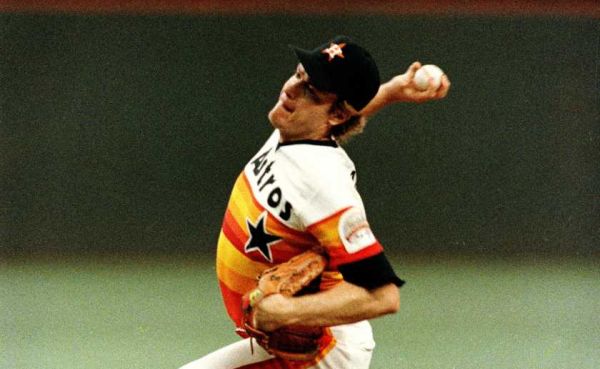
Scouts reportedly watched Scott with binoculars and could not offer any conclusive evidence of scuffing the baseball, leading one reporter to write: “Until they find Mike Scott in possession of a nail file, corkscrew or table saw, the New York Mets will lack the hard evidence to back up their opinion as to why he is so unhittable.”
The next day it rained in New York, postponing Game Five and providing the Mets with another opportunity to make their case against Scott. The team asked National League president Chub Feeney to examine 15 baseballs. Feeney promised to examine the baseballs himself before Scott pitched a possible Game Seven.
“We have some balls that were defaced,” said Johnson. “A lot of people believe it was done by Scott. I think Mike Scott could make a cue ball dance. But if he is defacing the ball, I’d like to see him stopped. What we have is circumstantial evidence. But I’d take a lie detector test on it.”
The controversy was getting ugly. Through the media, the Mets and Astros started a war of words. Backman and Howard Johnson, who saved baseballs hit into the Mets dugout, turned them over to the league. The move angered Astros manager Hal Lanier.
“If Backman and Johnson are such big fans of Mike’s, they can bring those baseballs over and Mike will autograph them for them,” said Lanier. “They say they have all these balls that are scuffed up. Who knows what happens to baseballs when they get in locker room. Mike (Scott) has never been found guilty of anything.”
Mental edge: New York.
Mike Scott peered out the Astros dugout as the Mets and Astros weaved and bobbed through 16 innings of Game Six. Everyone in the Mets dugout knew if they lost that night, the only way to get to the World Series was to beat the seemingly unbeatable Scott.
The Mets escaped a third showdown against Scott, winning 7-6.
“He watched from the dugout, he haunted us,” said Carter. “He stuck in the back of our minds. No, sir, we didn’t want to face him the following day for all the marbles … The man had a power over us even when he was spending the game on the bench.”
“I feel like I’ve been pardoned,” said Mets manager Davey Johnson after clinching in Game Six. “I really don’t want to see Scott again until next April.”
Post Script:
In 2009, Gary Carter was managing the Long Island Ducks and writing a blog for Newsday. More than two decades had passed since Carter whiffed helplessly against Scott.
Carter wrote, I have often been asked if I thought we could have beaten the Astros in Game 7 back in ’86 … Knowing Scott was looming for a Game 7 was big, and having to face him might have written a completely different story. He was dominant in the other two games we faced him, but knowing our team’s character, we would of found a way to win.
Time restores confidence, even if it takes two decades.


